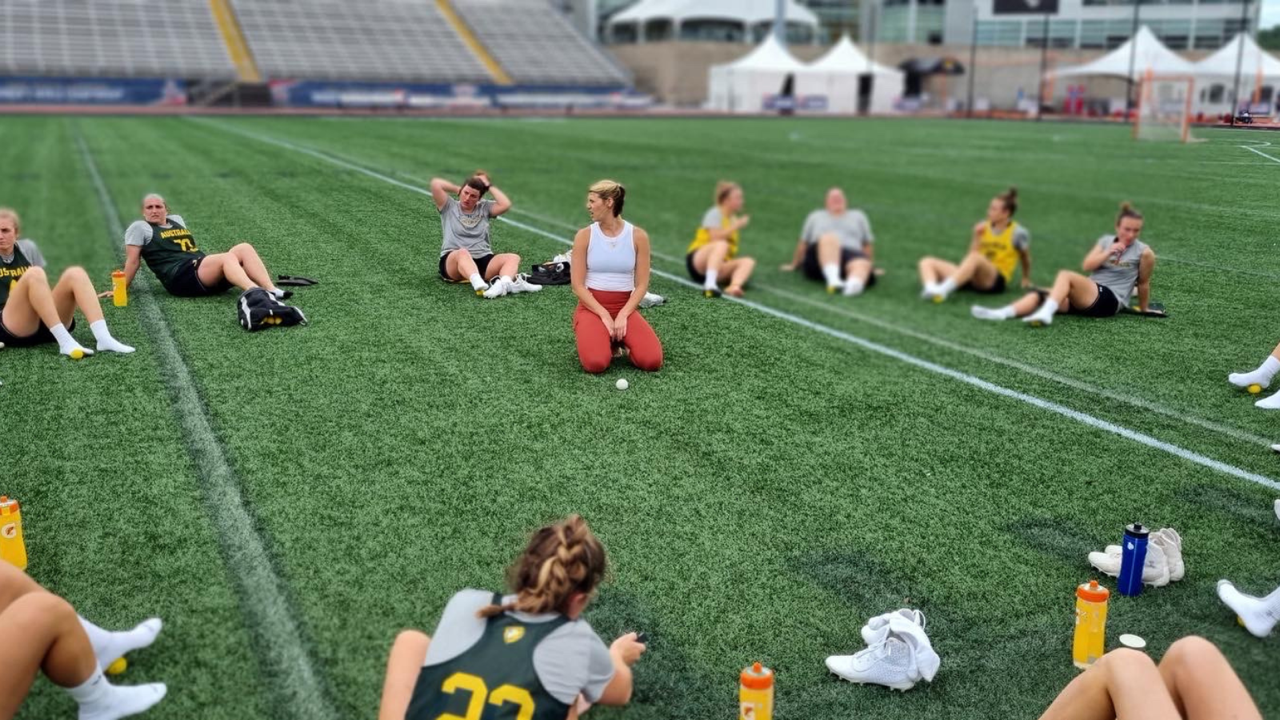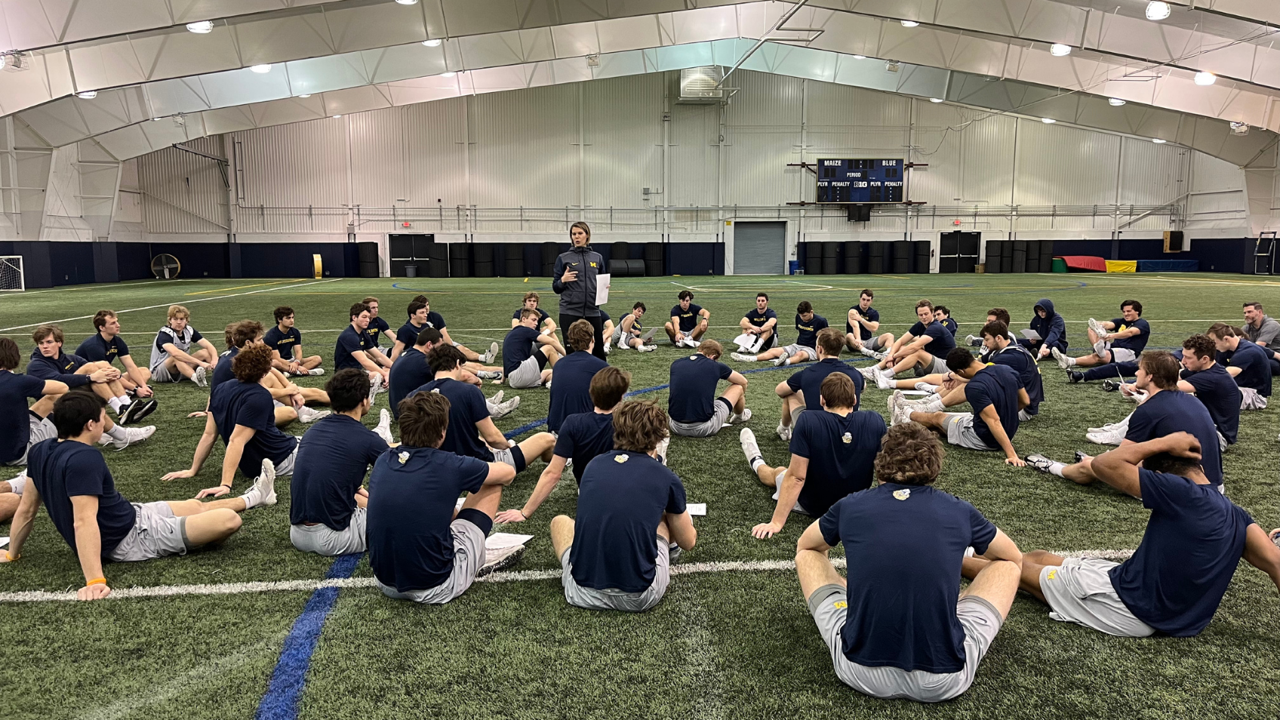Part Three: Building Athlete Nervous System Flexibility

The Nervous System has become quite a hot topic on social media. We need to acknowledge that the NS and building NS flexibility are complex! I see frequent messaging that includes:
- “If you struggle with X it means your nervous system is dysregulated”
- “Try this hack to regulate your nervous system”
- “This 1 thing will regulate your nervous system instantly”
NS flexibility and regulation are so much more than a tool, quick fix or hack. At a foundational level this is about developing a relationship with self. We can’t navigate dysergulation or build NS flexibility if we don't understand our own NS is to begin with!
Heres what regulating the nervous system and building flexibility is NOT about…
- Elimination of pain, discomfort or hard things
- Not being impacted by things
- Being happy and calm all the time
- Never experiencing dysregulation or any symptoms of dysregulation
- Never getting triggered
- Blindly trying tools and skills bc someone on social media tells ...
Part Two: Nervous System Dysregulation and the Impact on Athlete Health and Performance

If you missed Part 1 of my Blog Series I break down what the Autonomic Nervous system is as well as why working with it is so important for athlete health, well being and performance enhancement.
Lets talk about whats often keeping athletes from overall health and enhancing their performance. Chronic and pervasive nervous system (NS) dysregulation.
Chronic NS Dysregulation might look like...
Mentally and emotionally
- Chronic Anxiety (that seems to just always be there)
- Chronic Stress / overwhelm (with little to no relief)
- Loud inner critic and perfectionism (really hard on themselves, never feel like they're good enough, can’t acknowledge success or wins, Struggle to let go of mistakes / failure)
- Inability to control or work with self talk (spiral , ruminate, cant stop worrying, 0-100, down the rabbit hole)
- Drastic Mood swings, irritability, hypervigilence
- More specific performance related anxiety that is pervasive and really impacts daily life and performance ...
Part One: The Autonomic Nervous System. The Key to Athlete Success.

There’s A LOT of information circulating about “the nervous system” and “nervous system regulation” on social media. What I aim to do in this blog is simplify and give you the most pertinent information. I fully believe that the Autonomic Nervous System is a foundational piece of athlete health, well being and performance. Welcome to my 3 Part Blog Series where I break down all things Nervous System for athletes.
What is the Autonomic Nervous System?
The human nervous system is a complex system within us that consists of our brain, spinal cord and nerves. The nervous system consists of 2 main branches including the Central Nervous System and the Peripheral Nervous System.
The Autonomic Nervous System (ANS) is a PART of the Peripheral Nervous System. Most people on social media are referring to this as just “the nervous system” ( I abbreviate it as NS) but it’s important to know that we are indeed talking about the Autonomic Nervous System. The ANS has 3 primary job...
Sleep and Sleep Hygiene for Athletes

Many of the athletes I work with understand how to prepare their mind and body for sport and performance. However, I often find that we ALSO need to help our mind and body prepare for rest and sleep. Rest is often not prioritized in our society and sport culture. We live in a society that emphasizes the “Go Go Go”, more is better, and if you aren’t doing something you aren’t being productive enough. This isn’t always conducive to good quality sleep and non-sleep rest. We need to help athletes understand that sleep and non-sleep rest are a biological imperative for our overall health and well-being. Overall health and well-being are a precursor to athletic performance. When we DON’T get consistent adequate sleep and non-sleep rest, this can impact our mind and body in profound ways.
How does sleep/non sleep rest help an athlete?
- Restores our mind- body resources that we use and expend throughout the day
- Helps us consolidate learning and memory
- Supports nervous system regula ...
Part Four: Prioritizing Safety, Accessibility and Choice in Teaching Breath Work

Part Four: Prioritizing Safety, Accessibility and Choice in Teaching Breath Work
If you are just tuning in here is a recap of this Four Part Breath Work series. If you haven’t checked out these previous blogs I highly encourage you do so prior to reading this as Part 1-3 frame the context for this piece.
- Part One: A Trauma Aware Approach to Breath Work
- Part Two : Understanding the Breath and Nervous System
- Part Three: Exploring Breath Work, Where to Start?
The first thing I always encourage others that are interested in teaching or coaching breath work to do is self exploration. Self exploration should be the first place we start and I whole heartedly believe we should not be teaching or coaching breath work practice that we haven’t spent time with ourselves. You are your own best teacher. I fully believe that we can teach others by way of intimately knowing the practice. Part Three: Exploring Breath work, Where to Start? Can help you with this!
Getting Started
Let...
Part Three: Exploring Breath Work, Where to Start?

Part Three: Exploring Breath Work, Where to Start?
If you have not read Part 1 and Part 2 of this series I highly recommend you do as this will give you an in depth look at what breath work is and why it is imperative we be teaching and coaching breath work in more trauma aware and trauma informed ways.
- Part One: A Trauma Aware Approach to Breath Work
- Part Two : Understanding the Breath and Nervous System
I am passionate about helping all of my clients and athletes understand what breath work is and explore this practice with more awareness so that they may engage with the practice in ways that are centered around accessibility, safety and choice. These are what allow people to practice in ways that support them.
There are a variety of ways to engage in breath work but more importantly you do not have to engage in it at all. This is why I highly encourage everyone to start by thinking about their goal or intention for breath work before embarking on a breath work jo...
Part Two: Understanding the Breath and Nervous System

Part Two: Understanding the Breath and Nervous System
If you haven’t checked out Part One of this four part breath work series, A Trauma Aware Approach to Breath Work I highly suggest you do so. We break down why a trauma aware and trauma informed approach is critical when teaching and coaching breath work.
Now we will dive in to the nuances and connection of the breath and nervous system to reveal exactly why a trauma aware/informed approach supports our clients best.
What is breath work?
We can’t talk about breath work without first acknowledging what the breath is. To breathe is to be alive and breathing is the most basic physiological process that is required for living. Pranayama, which is often used to refer to “breath work” is the one of the 8 limbs of yoga. Prana, means “life force”. Yama means “extension or control”.
The breath is automatic but we can also control it.
In order to control or manipulate it, we have to genuinely understand it. At a foundational se...
Part One: A Trauma Aware Approach to Breath Work

Part One: A Trauma Aware Approach to Breath Work
As mainstream society continues to jump on the breath work bandwagon it is very important we continue to prioritize safety, accessibility and choice with regards to this practice. As a mental health therapist and mindfulness coach that works extensively with athletes, I am passionate about sharing the nuances of such an individualized and powerful practice. I have also personally experienced significant trauma, chronic anxiety and panic disorder in my life and I know firsthand how challenging breath work can be due to these experiences.
Welcome to this Four Part Series on Breath Work.
- Part One: A Trauma Aware Approach to Breath Work
- Part Two : Understanding the Breath and Nervous System
- Part Three: Exploring Breath Work, Where to Start?
- Part Four: Prioritizing Safety, Accessibility and Choice in Teaching Breath Work
Lets dive in!
Breath work is often sold as a grounding and calming practice. Things I have seen or hear...
Perrin Wellness and Performance. The Journey

Hello! Welcome to my work.
My name is Emily Perrin and I am a Mental Health Therapist and Mindfulness and Performance Coach. I am so thankful you are here and I’m excited to share my journey with you in detail. Although my path to this work has not been linear much of it has been shaped by my own lived experience.
The truth is I grew up in and around sport. My Dad was a college basketball coach at the University of Virginia for the first 10 years of my life where he also received his Ph.D. in Sport Psychology. Some of my earliest childhood memories are running around University Hall (which sadly no longer exists) at UVA and going to team practices. Even after leaving college basketball he has continued to work with some of the best athletes in the United States. His career has taken him across multiple professional leagues including the NBA, MLS, NWSL and to two World Cups with the US Men’s National Team. From a very young age this was my life. I knew there was another side to s...
A Mindful and Holistic Approach to Athlete Recovery

If you have not tuned in to my 3 Part Blog series on the connection between Mental health and Recovery please do so! Why Failing to Prioritize Recovery is Impacting Your Mental Health is a detailed look at how recovery and the mental health of an athlete are intimately linked. This will also help you understand the type of nervous system shift we are looking for and explain what the Parasympathetic (Ventral Vagal) Nervous System State is (Referred to as PNS in this Blog).
If you have not downloaded my Free EBOOK: The Athletes Holistic Guide to Recovery, this can be a great place to start!
I am a full advocate of explaining the “why” behind things before giving an athlete or coach solutions or answers. I find that the “WHY” is often what empowers an athlete to step into taking care of themselves more efficiently.
The recovery process will be unique and individual for every single athlete. When working with an athlete or a team I find it best and most beneficial to give options ...

